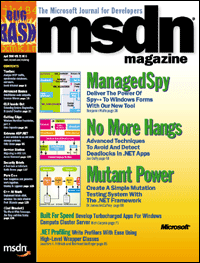 April 2006
April 2006
Managed Spy: Deliver The Power Of Spy++ To Windows Forms With Our New Tool
Spy++ displays Win32 information such as window classes, styles, and messages. Now you can get that same functionality for managed code using our ManagedSpy. Get it here. Benjamin Wulfe
No More Hangs: Advanced Techniques To Avoid And Detect Deadlocks In .NET Apps
You can combat deadlock using a combination of disciplined locking practices which Joe Duffy aptly explains in this article. Joe Duffy
Mutant Power: Create A Simple Mutation Testing System With The .NET Framework
With mutation testing, the system under test is changed to create a faulty version called a mutant. Here James McCaffrey explains how to do this in .NET. James McCaffrey
Built For Speed: Develop Turbocharged Apps For Windows Compute Cluster Server
This article explores the services provided by Compute Cluster Server 2003 and the tools provided by Visual Studio 2005 that will help you develop High-Perfomance Computing applications. Rich Ciapala
.NET Profiling: Write Profilers With Ease Using High-Level Wrapper Classes
Here Joachim H. Fröhlich and Reinhard Wolfinger show you how to get all the great functionality of the .NET Profiling API the easy way, with custom wrappers. Joachim H. Fröhlich and Reinhard Wolfinger
Columns
| Editor's Note: editor-s-note-april-2006.md
The returns are in. MSDN Magazine—or, we should say, the award-winning MSDN Magazine—has added a couple of trophies to the shelf. And in the spirit of sharing, we are also officially the award-giving MSDN Magazine.
|
Toolbox: Analyze HTTP Traffic, Synchronize Databases, and More
Debugging Web applications can be a difficult process due to the logical, physical, and temporal differences between the mishmash of technologies that comprise such an application. For bugs that arise from the HTML and script received by the browser or in the transfer or request of a page's markup, developers often adopt archaic debugging techniques, such as using View Source and Notepad to scrutinize the contents received by the browser. Scott Mitchell
|
Advanced Basics: IntelliSense Code Snippets
IntelliSense code snippets are one of the coolest new features in Visual Studio® 2005. Code snippets are highly customizable code fragments intended to accomplish simple to intermediate tasks quickly; they can be inserted into your code with just a few keystrokes. Lorenzo Minore
|
| CLR Inside Out: Extending System.Diagnostics
The System. Diagnostics namespace in the Microsoft® . NET Framework contains powerful tracing capabilities. This includes the main tracing API: TraceSource. As you will see, the tracing APIs in System. Krzysztof Cwalina
|
Cutting Edge: Windows Workflow Foundation, Part 2
In last month's column, I presented a helpdesk workflow sample that focused on Windows® Forms client applications. This month I'll discuss ASP. NET workflow applications and the ability to expose a workflow as a Web service and invoke a Web service from a workflow. Dino Esposito
|
Extreme ASP.NET: A New Solution to an Old State Storage Problem
State management in Web applications is a contentious issue. Should you store user data per session or should you persist it across sessions? You can easily store information temporarily while someone navigates your site by using session state. Fritz Onion
|
| Service Station: Migrating to WSE 3.0
You've probably heard that the new version of Web Services Enhancements (WSE) for the Microsoft® . NET Framework simplifies the process of building secure Web services. What you may not know is that most of these improvements derive from some core architectural changes made in WSE 3. Aaron Skonnard
|
Security Briefs: A First Look at InfoCard
The Web can be annoying at times. I'm certain that I'm not alone in my frustration with filling out the same old forms on every Web site I visit. Like most other techies, I've acquired many tools over the years to help combat this repetition, and I even wrote my own password manager for my hundreds of different identities on the Web. Keith Brown
|
Pure C++: How Templates and Generics Work Together
I'm closing out this series of columns on generic programming in the Microsoft® . NET Framework by showing how templates and generics do and do not work together, and pointing out a pitfall with the current implementation of templates under Visual C++® 2005. Stanley B. Lippman
|
| C++ at Work: Implement Triple-Click, Subclass the Main Window
Paul DiLascia
|
{End Bracket}: The World-Wide Telescope
Someday all scientific literature and data will be online and accessible to everyone everywhere. The astronomy community has made unusually good progress toward this vision of online science in addition to addressing the associated challenges of data publication. Jim Gray and Alexander Szalay
|

